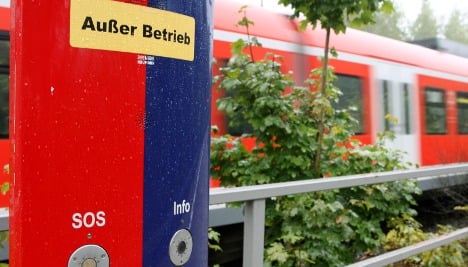According to the paper, the Solln station emergency phone is one of 20 that are out of order due to a dispute between national rail operator Deutsche Bahn and regional train service provider Bayrische Oberlandbahn (BOB).
According to train station owner Deutsche Bahn, the BOB built the emergency phones without their permission. Meanwhile BOB head Heino Seeger told the paper that his company was contractually obligated to provide the phones, but technical problems and “unfriendly” negotiations with Deutsche Bahn meant they were never turned on.
“Functioning phone towers could not have saved Dominik Brunner’s life, as the emergency calls went through to police via mobile phone,” the paper wrote. “But the feverish debate over more security at train stations raises the question of why.”
The 50-year-old business man was brutally beaten by two teenagers on Saturday afternoon after he confronted them for bullying a group of children on an S-Bahn train.
The 17 and 18-year-olds have been accused of murder. Police said that the young men had been threatening and demanding money from a group of younger teenagers at an S-Bahn station before following them onto a train, where Brunner intervened.
He called police on his mobile phone and offered to leave the train with the children to make sure they were safe.
As they left the train at the Solln train station, Markus S. and Sebastian L. followed Brunner and attacked him. They hit and kicked him some 22 times within just a few minutes. The children who had exited the train with the man attempted to stop the attackers unsuccessfully, according to state prosecutors. He died of his injuries in a nearby hospital a few hours later.
Police said Monday they had arrested a third suspect, 17-year-old Christoph T., for allegedly initiating threats against the group of children after they refused to give the older teens €15. He is accused of extortion. Witnesses also reported seeing him hit the group of children twice. The teen allegedly boarded a different train while his friends followed the younger children onto another – where they encountered their middle-aged victim.
All three of the teens in police custody have reportedly had brushes with the law in the past due to theft, assault and extortion. Two of the accused also reportedly suffer from substance addiction.



 Please whitelist us to continue reading.
Please whitelist us to continue reading.
Member comments